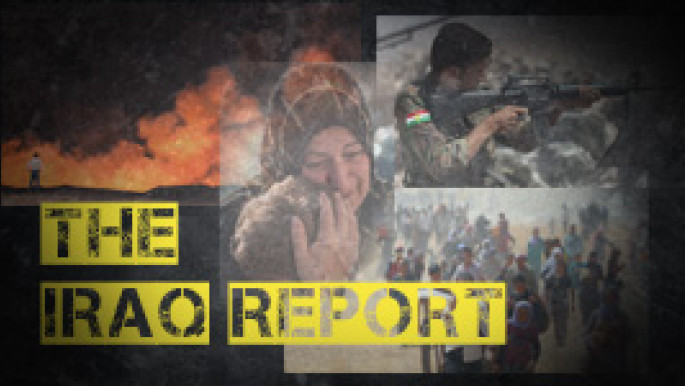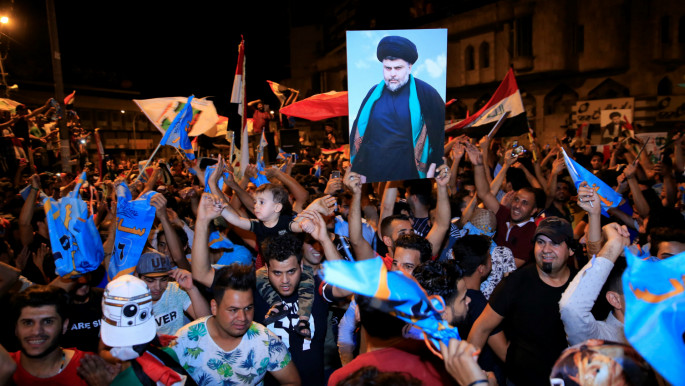The Iraq Report: Uncertainty looms as Sadr claims election victory
Click here to receive The Iraq Report each week in your inbox
In a surprising turn of events, radical Shia cleric Muqtada al-Sadr's Sairoun coalition has achieved remarkable success, as the bloc scoring the most seats in Iraq's first elections since the Islamic State group was defeated last year.
Sadr formed an alliance with secularists and the Iraqi Communist Party to take 54 of 329 seats in the Iraqi parliament, giving his party the first opportunity to form a new government. While Sadr did not run for political office himself, he is now in a position to act as kingmaker once again after being sidelined for years.
However, Iran has already publicly stated that it will not allow Sadr to successfully form any government - and has deployed its most infamous military commander to shift the situation in its favour. This comes in light of the recent withdrawal of the United States from the Iran nuclear deal, which means that Tehran will want to double down on its gains made since 2003.
With Iranian interference at play and a historically low voter turnout with already marginalised communities pushed even further into the periphery, Iraq is in for a politically turbulent ride.
Sadr's past violent sectarianism haunts him
While Muqtada al-Sadr has been described variously as a "nationalist", "non-sectarian" and an "anti-Iran" Shia cleric in recent media coverage of his electoral win, this was not always the case.
 |
Not only did Iran's Islamic Revolutionary Guard Corps (IRGC) supply and train Sadr's Mahdi Army, but it also made the necessary introductions for Sadr's men to train with Hizballah |  |
Sadr was in fact frequently identified as a "firebrand" Shia cleric, one of the first to establish an armed Islamist militia in the wake of the US invasion and subsequent occupation of Iraq in 2003. Having lived in Iran for decades, Sadr reached out to Tehran and his Mahdi Army received funds, weapons and training from Iraq's theocratic neighbour.
Not only did Iran's Islamic Revolutionary Guard Corps (IRGC) supply and train Sadr's Mahdi Army, but it also made the necessary introductions for Sadr's men to train with Hizballah in Lebanon, another IRGC proxy.
Immediately, the Mahdi Army set about targeting Sunnis in sectarian attacks, and also assassinating former Baath Party officials in Basra. A US journalist working for the New York Times who had been investigating the Mahdi Army's activities and corruption as they infiltrated the local police force was found murdered in Basra in 2005, with three gunshot wounds to his chest.
The journalist, Steven Vincent, and his Iraqi colleague, Noor al-Khal, were abducted by men in police uniforms before being shot.
 |
|
| Read more from our archive of special coverage on Iraq |
The Iran-sponsored and -trained death squads operating in Iraq began to become more prevalent, with Sadr's militias playing a large role in the sectarian violence against Sunni civilians. Major media outlets reported that in the three years since the US invasion, estimates of up to 655,000 people were killed in sectarian attacks.
With such gratuitous violence meted out by Sadr's men - as well as other Iran-linked militants from the Badr Organisation and other IRGC proxies - his sudden turn towards communists and secular nationalists is likely to be seen in the long-term to have been a pragmatic move.
A low voter turnout, with millions directly or indirectly excluded from voting, and an online election boycott movement will all have been contributing factors to electoral victory rather than any mass appeal possessed by Sadr.
Low turnout and marginalised Sunni vote portends instability
In democracies, legitimacy stems from the people's engagement in the democratic process. However, Saturday's election witnessed a record low voter turnout, with more than half of all eligible Iraqis deciding to eschew the vote.
Only 44 percent of eligible voters cast a ballot on Saturday, while no election since 2003 has had a voter turnout of less than 60 percent. This has been viewed as an indictment of the Iraqi political system, with many Iraqis - particularly the impoverished youth - feeling that they have no say no matter who they vote for, with a corrupt political class accused of draining the country's wealth.
 |
| Sadr's supporters celebrate his alliance's victory [Getty] |
Further analysis shows that about a third of the population of 37 million are either languishing in IDP camps with little access to services - let alone democracy - or are in urgent need of humanitarian assistance, according to the United Nations. While many of these will be children unable to vote, it is highly likely that millions of these people - who are predominantly Sunni Arabs - will either be unable to vote or will face significant obstacles in engaging with the democratic process due to their priorities being to survive rather than scrutinise campaign promises.
With a significantly marginalised Sunni vote, and some political candidates even describing refugees in IDP camps as "Daesh families", using the Arabic acronym for IS, it is clear that such exclusionary politics will exacerbate, not remedy, the conditions that led to the rise of extremist groups such as IS.
Even if Sadr had not won and other parties had taken the lead instead, it still seems a distinct possibility that Iraq will be thrown into yet another period of instability and chaos as no single bloc is capable of winning a majority of the 329 seats. This will mean a lengthy period of horse-trading will soon commence, with foreign powers looking to shape the formation of the new government.
Without the citizens of a democracy actively participating in democratic activity - and not necessarily exclusively the voting process - then it is arguable that any country claiming to be a democracy would have to ask itself some serious questions about the legitimacy of its elections.
 |
We will not allow liberals and communists to govern in Iraq |  |
Iran deploys infamous general
While incumbent Prime Minister Haider al-Abadi - whose Victory Alliance was pushed into third place - has vowed to work with Sadr's coalition in order to form the "strongest government for Iraq", and asked for the vote's outcome to be respected, Iran has other ideas.
Commenting on Sadr's alliance with communists and secularists, Ali Akbar Velayati, senior adviser to Iranian Supreme Leader Ayatollah Ali Khamenei, said in February: "We will not allow liberals and communists to govern in Iraq."
While Baghdad often claims sovereignty and states that Iran is merely an ally in the fight against "terrorism", Iranian official statements such as this reveal the true extent of Tehran's influence over Iraqi affairs.
Now that Sadr's list has won the most seats, it seems that Iran already plans to upset any notion that the incoming Iraqi government will not work for Iranian interests.
IRGC Quds Force commander Major-General Qassem Soleimani has been deployed to Iraq with the reported aim of ensuring the Iraqi government remains in Iran's camp. According to sources from the prime minister's office who spoke to The New Arab's Arabic language service, Soleimani was in Baghdad to meet with Shia leaders and other political allies in order to sidestep any potential damage caused by Sadr, who has been described as an "unstable ally" to Iran.
Twitter Post
|
Sadr has already tweeted a witty refrain comprised of the names of the parties that he may be willing to work with in a broad coalition government, none of whom appear to include the Conquest Alliance, or Fatah in Arabic, a group formed by staunchly pro-Iran militants such as Qais al-Khazali, Akram al-Kaabi, and Hadi al-Amiri.
In light of the Trump administration's withdrawal from the nuclear deal with Iran, Tehran is likely to be doubling down on its gains in Iraq, the linchpin of its expansionist strategy ever since the US toppled Saddam's regime in 2003.
Iran may either decide to weaken Sadr by incentivising his allies to break away from his coalition, or it may attempt to rehabilitate Sadr back into the Iranian sphere of influence where he once enjoyed their support in setting up his powerful militia.
Either way, it is highly unlikely that Iran will simply accept the election results without actively shaping the future Iraqi government to ensure its continued loyalty to Tehran's agenda.
Click here to receive The Iraq Report each week in your inbox





 Follow the Middle East's top stories in English at The New Arab on Google News
Follow the Middle East's top stories in English at The New Arab on Google News


